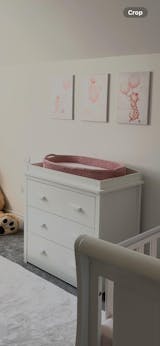Becoming a parent is an incredible journey - but let’s be honest, sleep can feel like a distant memory in those first few months. While newborns have their own unpredictable sleep cycles, there are ways to maximise your rest and create a more peaceful sleep routine for your baby.
In this guide, we’ll share practical, parent-tested tips to help you and your baby get more sleep, focusing on Moses baskets as a safe and comforting sleep space, and how baby nests can support daytime rest.
1. Set Up a Safe & Comfortable Sleep Environment
Why a Moses Basket is Ideal for Newborn Sleep
A Moses basket provides a cosy, breathable, and portable sleeping space, making it a perfect first bed for newborns. Here’s why parents love them:
- Safe Sleep Space – Moses baskets offer a firm, flat mattress, following NHS guidelines for safe baby sleep.
- Helps Baby Feel Secure – The smaller size mimics the womb environment, helping babies settle more easily.
- Easy to Keep Baby Close – Place the Moses basket next to your bed for easier night feeds.
- Portable – Move the basket around the house to keep baby close during naps.
💡 Pro Tip: Keep the sleep area free from pillows, loose blankets, and soft toys to ensure a safe sleep environment.
What About Baby Nests?
While baby nests are not recommended for overnight sleep, they can be a great option for supervised daytime naps and lounging. They provide a soft and enclosed space, which many babies find comforting for short rest periods during the day.
2. Master the Art of Baby Sleep Cues & Routine
Newborns don’t have a set day and night rhythm yet, but looking for early sleep cues can help prevent them from becoming overtired.
Signs Your Baby is Ready for Sleep:
- Yawning or rubbing eyes
- Becoming quiet or less active
- Looking away or avoiding eye contact
- Slight fussiness before full crying
When you spot these cues, begin your baby’s wind-down routine to help them settle before they become overtired.
3. Swaddling & Layering for a Snug Sleep
Newborns often startle themselves awake due to the Moro reflex (sudden jerky movements). Swaddling can help reduce this by making them feel secure and contained—much like they were in the womb.
How to Swaddle Safely:
- Use a lightweight, breathable swaddle blanket.
- Keep the swaddle snug but not too tight, ensuring baby’s hips have room to move.
- Stop swaddling once your baby starts rolling over (around 8 weeks).
4. Make Night Feeds & Nappy Changes Quick & Calm
One of the biggest sleep disruptors for parents is night feeds and changes. Keeping these low-stimulation can help your baby settle back to sleep faster.
Tips for Night-Time Efficiency:
- Keep the room dimly lit – Use a soft nightlight instead of bright overhead lights.
- Have everything within reach – Keep nappies, wipes, and a fresh sleepsuit nearby.
- Avoid too much interaction – Keep talking soft and minimal so baby doesn’t fully wake up.
- Use a Moses basket next to your bed – Makes it easier to settle your baby after feeds.
5. Nap When Baby Naps (Seriously!)
You’ve probably heard this advice a hundred times and as parents ourselves, we understand it's not always possible, but when there is a chance - it's one of the best ways to catch up on sleep.
- Even a 20-30 minute nap while your baby sleeps in their Moses basket can help you feel more refreshed.
- Don’t stress about unfinished chores - prioritise rest when you can.
- If possible, share night feeds or morning wake-ups with your partner to get a solid stretch of sleep.
6. Don’t Be Afraid to Ask for Help
Exhaustion can take a toll, so don’t hesitate to ask your partner, family, or a close friend to help with baby care while you rest.
- If you’re exclusively breastfeeding, consider expressing milk so someone else can handle one feed.
- If possible, let your partner handle the first morning wake-up so you can grab an extra hour of sleep.
- If you’re struggling with sleep, talk to your health visitor or GP - they can provide guidance and reassurance.
Final Thoughts
Sleep as a new parent is never perfect, but small changes - like using a Moses basket for safe, cosy sleep, learning your baby’s sleep cues, and keeping night-time calm - can make a huge difference.
While baby nests are not for overnight sleeping, they can be a useful supervised rest spot during the day, helping your baby feel snug and secure.
✨ Sweet dreams, little one! ✨









